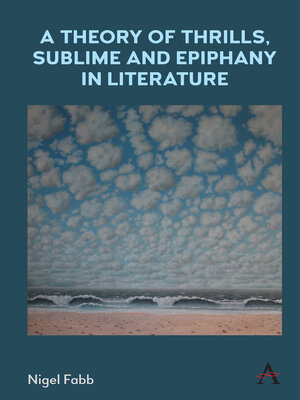A Theory of Thrills, Sublime and Epiphany in Literature
ebook ∣ Anthem Studies in Bibliotherapy and Well-Being
By Nigel Fabb

Sign up to save your library
With an OverDrive account, you can save your favorite libraries for at-a-glance information about availability. Find out more about OverDrive accounts.
Find this title in Libby, the library reading app by OverDrive.



Search for a digital library with this title
Title found at these libraries:
| Library Name | Distance |
|---|---|
| Loading... |
This book offers a psychological account of thrills (goosebumps and tears), of the epiphanic experience of seeing ordinary things in a profoundly new way, and of the experience of the sublime. The unifying characteristic of these 'strong experiences' is that they all begin with surprise. They are important in literature: literature is about these experiences, and literature can cause these experiences. This book offers an overview of theories of these kinds of experience, and of what might cause them to happen. In the final chapter, various literary strategies are explored as possible causes. The book draws on psychological accounts of surprise, and of emotion, and cognitive approaches to what knowledge is, why it is possible to have feelings of profound knowledge, and why what we know can sometimes not be put into words.
|This book groups together three kinds of experience: the experience of the sublime, of 'epiphany' which is generally a profound experience of something ordinary, and the feeling of 'thrills' which can be a shiver down the spine or sudden tears.
These 'strong experiences' have been extensively studied, but almost always separately from one another, and in a variety of disciplines, and so this is the first major attempt to bring them together under a relatively simple psychological account. The book reviews some of the work on the sublime and epiphanies, including life-changing epiphanies, in the literary critical, philosophical and psychological literature. It explores how we can feel that we know things which are deeply important without being able to put what we know into words, and it also offers an introduction to some basic psychological ideas about knowledge. The book focuses on the physical aspects of the experience, and their relation to emotions, and looks in detail at what the body actually does when we feel goosebumps and similar sensations. It continues to outline some of the simple psychological notions which support this account of strong experiences, including how surprise works, and other related notions such as curiosity, attention and empathy, and why ordinary things can sometimes be perceived as though they are sources of profound insight.
The final section briefly summarises various devices in literary texts which can be used to trigger strong experiences in a reader. It concludes by noting that our strong experiences of literary texts and other aesthetic objects are related to our more general aesthetic experience.






